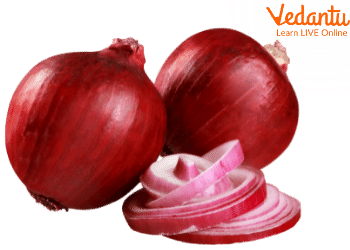




Onions - An Important Part of Our Diet!
Do you know that onions are one of the oldest cultivated plants? Onions are vegetables and They are a part of the bulb family. It is made up of crisp and fleshy layers. You must have eaten onions either raw or cooked.
Onions are an important ingredient for many dishes and it is valued for their flavor. You must have seen your mother bring some onions from the supermarket but do you know that there are 27 different varieties of onions found across the world, and some even weigh over 10 pounds? Now let us learn more about onions and where onions come from and how such a little vegetable makes us cry.

Different Varieties of Onions
Where Do Onions Come From?
Onion is a herb that belongs to the Lily family. It is also related to garlic, leeks, and chives. Its scientific name is Allium cepa. Today onions are being cultivated all across the world but long before farming was invented, wild onions were a staple in the prehistoric diet. Many botanists, food historians, and archaeologists believe onions originated in central Asia. Other research also suggests onions were first grown in Iran and West Pakistan.
While their exact origin is a mystery, onions may be one of the earliest cultivated crops. It is found that onions in Chinese gardens are referenced in some of the oldest Vedic writing from India, as early as 5000 years ago.
Onions are grown in mild climates all over the world but some of the top onion producers include China, India, the United States, and Turkey.
Onions have long hollow leaves that look like stalks. The bulb forms at the bottom of the stalks, just under the soil as onions are grown under the soil. Onion bulbs are of different sizes, shapes, colors, and flavors. They range from less than 1 inch to more than 4.5 inches. They may be of white, yellow, or red color.
Why do Onions Make Us Cry?
You must have seen your mother cutting onions for a dish. I’m sure that after seeing that you would have immediately left the room because you must have known that onions will make you cry. Onions contain an oil that is rich in the mineral sulfur, on cutting this oil is released into the air. The oil mixes with the fluid in a person’s eyes and irritates the nerves around the eyes making the eyes tear.
So the next time when you have to cut an onion try washing them under running water before cutting them. The water washes off some of the sulfuric compounds that cause you to tear up.
Onions are not just used in cooking but many more important users' letters have a glance at them.

Onion Cutting
Important Uses of Onion
Onions are also used as a medicine. Some cultures use them to get rid of coughs, fevers, and even animal bites.
Many people also use onions for their hair growth. Onions contain sulfur that boosts collagen production in the tissues and helps in the regrowth of hair.
There are some more things to know about onions. They are also used to repel insects, clean rusty knives and metal utensils, etc.
Summary
Onions are a part of the bulb family and it is valued for their flavor. There are 27 different varieties of onions found across the world, and some even weigh over 10 pounds. Other research also suggests onions were first grown in Iran and West Pakistan. Onions may be one of the earliest cultivated crops. The bulb forms at the bottom of the stalks Onion bulbs are of different sizes, shapes, colors, and flavors. Onions contain an oil that is rich in the mineral sulfur, on cutting this oil is released into the air.
Onions are also used as a medicine. Many people also use onions for their hair growth. Onions contain sulfur that boosts collagen production in the tissues and helps in the regrowth of hair.
FAQs on Let’s Discuss About Onion
1. What is an onion and which part of the plant do we eat?
An onion is a popular vegetable used in cooking worldwide. The part of the onion we eat is the underground bulb, which is the base of the plant's leaves. This bulb stores food for the plant, which is why it's fleshy and has many layers.
2. What are the different types of onions and what are they used for?
Onions come in several varieties, each with a different flavour and best use. The most common types include:
- Yellow Onions: An all-purpose onion that is great for cooking in almost any dish.
- Red Onions: Milder and sweeter, often used raw in salads, burgers, and sandwiches.
- White Onions: Have a sharper, more pungent taste and are commonly used in Mexican dishes and salsas.
- Sweet Onions: Very mild and sweet, making them perfect for eating raw or for making onion rings.
3. Why do our eyes tear up when we cut an onion?
When you cut an onion, you break open its cells, which releases certain chemicals into the air. One of these is a sulphur-based gas. When this gas mixes with the moisture in your eyes, it creates a mild acid that irritates them. Your eyes produce tears as a natural defence to wash this irritant away.
4. What are the main health benefits of including onions in our diet?
Onions offer several important health benefits. They contain antioxidants that protect our bodies from damage. Including onions in your meals may help to reduce high cholesterol and support heart health. Furthermore, onions are a good source of fibre and folic acid, which help the body make healthy new cells.
5. How do onions get their strong smell and taste?
The strong, pungent flavour and smell of an onion come from sulphur compounds that the plant absorbs from the soil. These compounds are safely stored inside the onion's cells. When the onion is cut or crushed, these compounds are released and mix to form the sharp taste and smell we are familiar with.
6. Besides cooking, what are some other interesting uses for onions?
Onions have many surprising uses beyond the kitchen. They can be used as a natural mosquito repellent or to soothe insect bites. Some people use onion juice to promote hair growth. Onions can also be used to clean metal surfaces like barbecue grills or to polish silverware due to their acidic properties.
7. How are onions grown and when are they harvested?
Onions are typically grown from small bulbs called 'sets' or from seeds. They are planted in sunny, well-drained soil. As the plant grows, it forms green shoots above the ground while the bulb develops underground. Onions are ready to be harvested when the green tops start to turn yellow and fall over. They are then pulled from the soil and left to dry.
8. What is the difference between an onion and a spring onion?
The main difference is the stage of growth at which they are harvested. An onion is the mature, fully-grown bulb of the plant. A spring onion (or scallion) is the same type of plant but is harvested much earlier, before the bulb has had a chance to swell. With spring onions, we eat both the small white bulb and the long green stalks.









